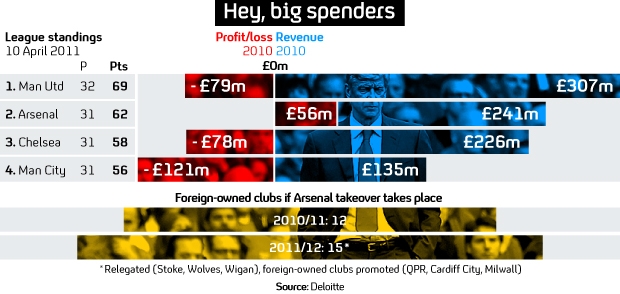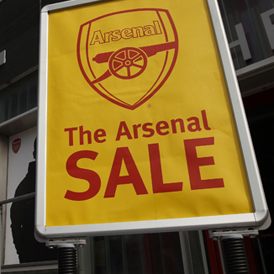Is it the ‘English’ Premier League anymore?
It may be the wealthiest league in the world but just how long will it be until there is no UK finance involved in Premier League clubs? Channel 4 News charts the changing face of the top flight.

Arsenal have become the 10th Premier League club to be taken over by a foreign company after American Stan Kroenke gained control of 62 per cent of the club. Of the 20 clubs in the top flight, twelve have international majority shareholders.
It is not yet understood how Mr Kroenke will pay for his stake, either as a risk-free cash buy or from serviced loans, but it his addition of shares from his previously owned 30 percent stake is set to cost hundreds of millions of dollars, with Arsenal now priced at $1.2bn.
The US tycoon has also tabled a bid for fellow share-owner Alisher Usmanov’s 27 percent of share, that could result in Groenke holding 89 per cent of the club.
Arsenal have bucked the trend of financial misery at the top end of English football over recent years.
Arsenal have bucked the trend of financial misery at the top end of English football over recent years. Moving from the relatively small Highbury Stadium to the Emirates Stadium has raised huge revenue in ticket sales that has helped service repayments for the build of their new home, whilst the developmet of their old ground into flats has raised millions in profits.
Whilst clubs including Chelsea and Manchester City reported regular annual losses and football giants Manchester United and Liverpool struggled to pay mounting debts, Arsenal have run at a profit since moving to their new home with pre-tax earnings of £56m for 2010.
However, for the north London club have just announced their first loss in years, £2.5m down in their half-yearly accounts, and although these figures still compare favourably against the other giants of the English game, fans will be worried where their new owner is getting his money from and just what burden any borrowing might put on the club that UEFA use as a financial model for all other European teams to follow.
Premier League – money spinner or bottomless pit?
The global interest in English football is undoubtedly related to the millions of euros more revenue created by the league than any other in Europe. The Deloitte Money League puts the Premier League annual revenue at 2.43bn euros compared to the next biggest, Italy’s Serie A, that garners just 1.43bn euros.
If promotions and relegations to and from the Premier League go a certain way over the next two months, the number of foreign-controlled clubs could rise from 12 to 15 out of 20. In the event of Wigan Athletic, Wolverhampton Wanderers and, though currently unlikely, Stoke City are relegated and then replaced by QPR (Italy/India), Cardiff (Malaysia) and Milwall (US) then three quarters of the clubs in the Premier League will have mojority foreign financial interest.
If promotions and relegations to and from the Premier League go a certain way over the next two months, the number of foreign-controlled clubs could rise from 12 to 15 out of 20.
However, the huge revenue in the sport in England does not guarantee massive profits. Since taking over Chelsea FC in 2003, owner Roman Abramovich has ploughed over £800m into the club and as yet the London team has not run at a profit. In 2010 they registered pre-tax losses of £78m.

This compares with the other big spender in the league, Manchester City, who have spent £350m in the last three years on players but with a lack of silverware, and revenue from Champions League football and prize winnings,the club operated at a loss of over £100m in 2010.
To buy into the world’s most lucrative football league is clearly an expensive business. Even the footballing Goliath Manchester United have risked being felled by their troubling debts. Although operating an annual revenue of nearly 350m euros, United are having to help service owner Red Football Joint Venture’s £590 million pound debt, and the company as a whole announced losses of over £100m for 2010.
Similarly, without the takeover of Liverpool in 2010 by American John Henry, English football’s most successful club faced defaulting on its massive loans and would have been at risk of administration. Such a risk became a reality for Leeds United, who went from Champions League semi-finalists in 2001 to the third tier of English football in 2007, narrowly avoiding liquidation in 2007.
The state of foreign involvement in the finances of the national sport now mirrors that of the players involved. In the current 2010/11 season 337 players are from outside England out of an estimated 500 footballers registered to play in the Premier League.
The Barclays Premier League as it stands with details of foreign investment (major stakeholder)
Manchester United - US - The Glazer family
Arsenal - US - Stan Kroenke
Chelsea - Russia - Roman Abramovich
Manchester City - UAE - Sheikh Mansour Bin Zayed al Nahyen
Tottenham Hotspur - UK - ENIC Group
Liverpool - US - John Henry
Everton - UK - Bill Kenwright
Bolton Wanderers - UK - Eddie Davies
Newcastle - UK owned - Mike Ashley
West Bromwich Albion - UK owned - Jeremy Peace
Fulham - Egypt owned - Mohammed Al Fayed
Stoke City - UK owned - Peter Coates
Sunderland - US owned - Ellis short
Aston Villa - US - Randy Lerner
Blackburn Rovers - India - Venkys
Birmingham City - China - Carson Yeung
Blackpool - Latvia - Valeri Belokon
West Ham - Iceland - Straumur Investment Bank
Wolves - UK - Steve Morgan
Wigan - UK - Dave Whelan